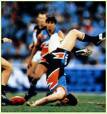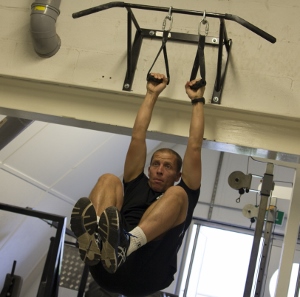Main Menu
Latest Blog Entry
User login
Injury Prevention in the gym: Roy Headey

Do any of the following rugby-related comments sound familiar?
- “There’s a gym culture in rugby that produces ‘gym monkeys’ and that’s what’s spoiling the game”
- “Nowadays, players spend too much time in the gym and not enough time practicing skills”
- “They’re supposed to be rugby players, not weight-lifters”
- “Weight training is dangerous for young players”
All of these are gross oversimplifications and in the last case, plain wrong.
Elite players certainly spend more time in the gym now than they did in the past. But their training is more than simply about getting “bigger” (hypertrophy). An over-emphasis on size alone can result in players who are bigger, but often fatter and slower too; they’re not much use for a dynamic game like rugby.
It’s also true that a bigger guy moving fast will exert more force in a collision than a smaller one moving at the same speed, but better conditioning and specific strength training can help players of all shapes and sizes to protect themselves against injuries.
 A lot of work players do in the gym nowadays is actually improving their resistance to injury, so spending time in the gym doing the right things can have a beneficial effect.
A lot of work players do in the gym nowadays is actually improving their resistance to injury, so spending time in the gym doing the right things can have a beneficial effect.
That being said, things can go wrong in the gym if players aren’t following well-designed programmes.
Generating a muscle imbalance through poor training is a one example. Muscles work in a complimentary fashion around joints; if there’s an imbalance in the way those muscles interact, one or more of the major muscles can exert extreme forces on a joint that is less able to protect itself.
For example, if a player does a lot of bench press work but not enough complimentary pulling and shoulder stability training, he can create instability in the shoulders that dramatically increases his predisposition to shoulder injuries.
So that’s definitely the sort of gym culture and gym monkey we don’t want to encourage. Information is also available about strength and conditioning coaching certificates, designed to provide accessible, practical training for sports coaches in the specifics of fitness development.
Roy Headey: RFU Head of Sports Science
Read more
- 10 fitness tips and myths of rugby fitness training
- Strength and power developments in rugby over the last 10 years
Client Testimonials
 Blundells School
Blundells School
James has a huge breath and depth of knowledge on fitness issues. He is able to implement this knowledge into a practical course both making the task of fitness and conditioning both different and interesting from other fitness training that most are familiar with. He understands the safety issues when dealing with young adults strength and conditioning programmes. Programmes he sets are tailored to the individual needs of the group. There was a huge amount of progress made with some of these individuals in terms of their understanding of fitness and their own fitness levels.
More

